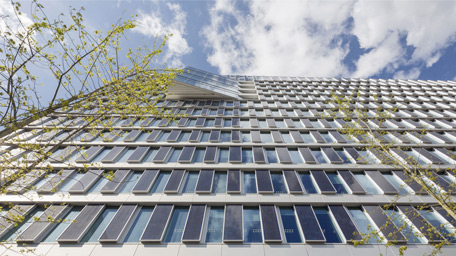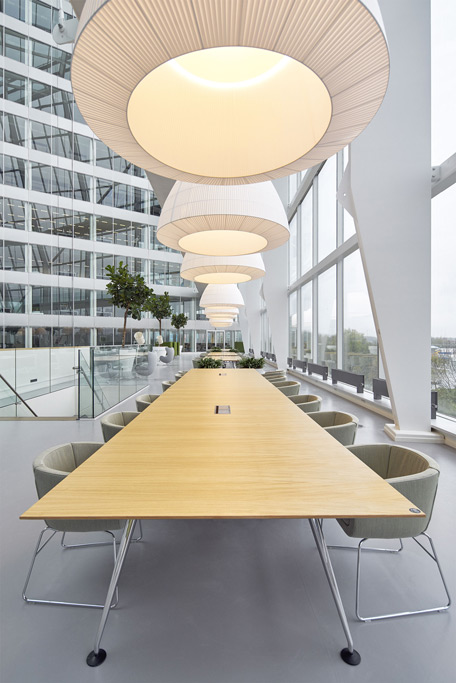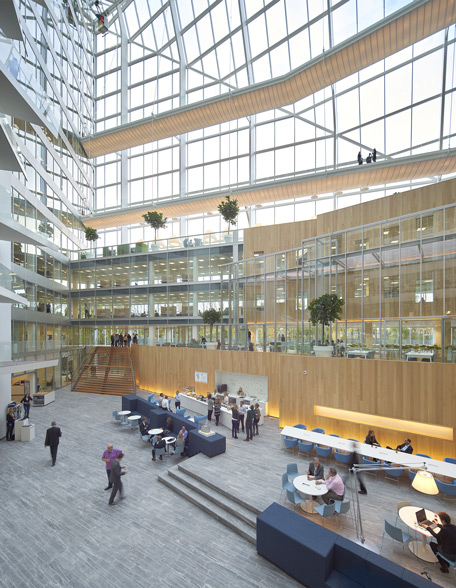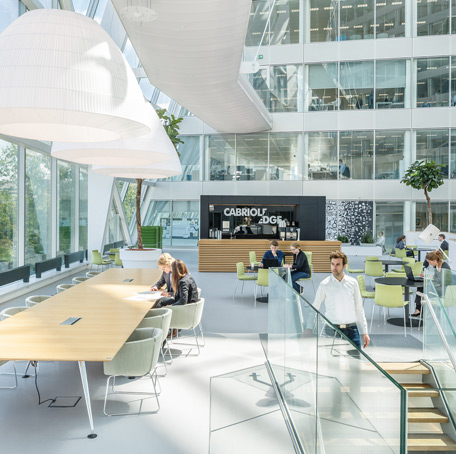- City Fajr Shuruq Duhr Asr Magrib Isha
- Dubai 04:28 05:46 12:20 15:47 18:49 20:07
Imagine a building that recognises you the moment you approach it, knows where and how far you live, knows what car you drive and if it’s due for servicing, knows your meeting schedule today … even how many steps you need to walk to achieve your daily target.

Such a building does exist: the Edge in Amsterdam, the corporate headquarters for management consultancy Deloitte, who collaborated with innovative Dutch real estate developer OVG Real Estate to make this marvel of a building.
The Edge leverages the Internet of Things and is packed with 28,000 light, heat and motion-detecting sensors. Its central atrium is 15 storeys high and acts as both the lungs and the eyes of the building, circulating fresh air throughout the building and capturing and distributing daylight.
While the Edge can be called the ‘Burj Khalifa’ of green buildings – the pinnacle of perfection – how exactly do buildings in the UAE and the rest of the region fare when it comes to ‘smartness’?

Dubai, Doha have region’s smartest buildings
A new survey of buildings across the Middle East by a global technology player shows that Dubai and Doha top the list for cities with the “smartest” buildings, with Abu Dhabi following at the No. 3 slot.
This survey, developed by Honeywell along with researchers Nielsen and global advisors Ernst & Young, assigned a smart building score to each of the 620 buildings that it evaluated across seven major Middle East cities: Abu Dhabi, Dammam, Doha, Dubai, Jeddah, Kuwait City and Riyadh.

The buildings that were assigned the new Honeywell Smart Building Score included airports, hotels, hospitals, office and residential buildings along with educational and retail facilities.
Honeywell explained that the assessment is of a building entails evaluating its use of 15 technology assets to find out which systems are in place to make them green, safe and productive — the three main indicators of smart buildings.
The systems’ overall capabilities, coverage of the facility and uptime are then factored in. Overall, Dubai and Doha led the scores across the board, the global technology firm said.

The average building score in Doha was 70 (out of a possible 100) – more than 20 points above the regional average of 48. The average score in Dubai was 65. Abu Dhabi came third, with a score of 48.
Ambitious Dubai among world’s smartest by next year
“Dubai is setting ambitious goals. It has laid out its Smart City Initiative that aims to ensure that it ranks amongst the world’s best-connected and smartest cities by 2017,” says the Honeywell white paper published along with the score.
“This initiative has three key areas: smart economy, smart life and smart tourism. Focus areas are on mobility, energy, water, waste, solar power, smart grids, e-government initiatives, connectivity, and automation,” it notes.
“As far back as 2011, the Dubai Municipality enacted the ‘Green Building Regulations & Specification in the Emirate of Dubai’ in alignment with its Strategic Plan 2015. These became immediately mandatory for government bodies and optional for private developers. In line with the city’s commitment to become a world leading ‘green’ city and to make Expo 2020 an environmentally sustainable event, Dubai Municipality issued a circular, making the existing Green Building Regulations and Specifications mandatory for the private sector as of March 1, 2014,” it explains.
“The Green Building Regulations apply to all buildings in the city, including those in free trade zones. Affected buildings are categorized into one of four fields: villas, public, residential/commercial, and industrial,” it says.
How do you define ‘smart’ building?
According to the Institute for Building Efficiency, “smart buildings deliver useful building services that make occupants productive (e.g. illumination, thermal comfort, air quality, physical security, sanitation, and many more) at the lowest cost and environmental impact over the building lifecycle.”
Reaching this vision requires adding ‘intelligence’ from the beginning of design phase through to the end of the building's useful life.
“Smart buildings are the fundamental building blocks of smart cities, and every city in the survey showed clear leadership in delivering examples of benchmark-setting smart buildings,” said Norm Gilsdorf, president for Honeywell’s Middle East, Russia and Central Asia regions.
“The survey results show that the region is well on its way to achieving its smart city goals, with Dubai, Doha and Abu Dhabi in particular serving as great examples for the region,” added Pete Costa, vice president, Honeywell Automation and Control Solutions for the Middle East.
Airports are ‘smartest’; Schools are ‘dumbest’
Overall, the region’s airports are leading the way with smart building technologies, with an average score of 80.
Hotels had an average score of 57, followed by hospitals at 56, retail at 52 and private offices at 46. Scoring the lowest were high-rise residential buildings at 45 and education facilities at 41.
The survey, however, shows that more than half of those surveyed in the region had only limited connectivity and integration of building systems.
With the exception of airports, connectivity and system integration were found to be lagging. More than half (57 per cent) of the buildings surveyed were found to lack efficiency-boosting technology that helps centralise facility information and streamline operations.
Across the Middle East, buildings scored only an average of 38 on asset capability. This number is influenced by investment in smart systems such as gas and water leakage detection, health and fire safety fixtures, energy-efficient components, and emergency power systems.
What will make our buildings ‘smarter’?
The Institute for Building Efficiency maintains that smart buildings use technology to connect a number of subsystems so that these systems can share information to boost total building performance.
Smart buildings aren’t just smart because of the equipment used – they are connected and responsive to the smart power grid, and they interact with building operators and occupants to empower them with new levels of visibility and actionable information.
“We spend 80 to 90 per cent of our lives in buildings; they are an integral part of a city’s ecosystem. With the advent of new technologies, the role buildings play is being redefined from a static environment to a more dynamic and interactive space that impacts the happiness, lifestyle, well-being and productivity of occupants,” said Gilsdorf.
“The scores also reflect the local regulatory focus on building codes, which is a crucial driver behind creating and maintaining smarter buildings. Investing in smart building solutions can make facilities more connected and adaptive, reduce energy and operating costs, and improve the safety and quality of life for occupants and users,” said Costa.
![]() Follow Emirates 24|7 on Google News.
Follow Emirates 24|7 on Google News.